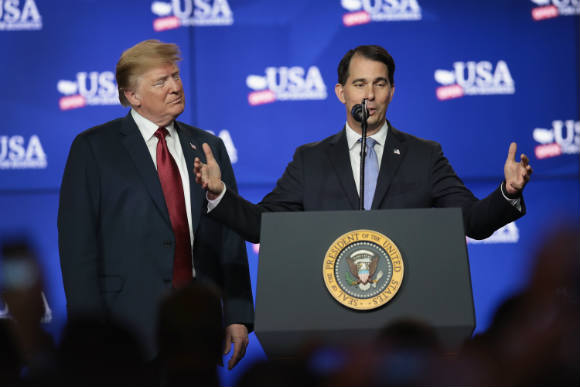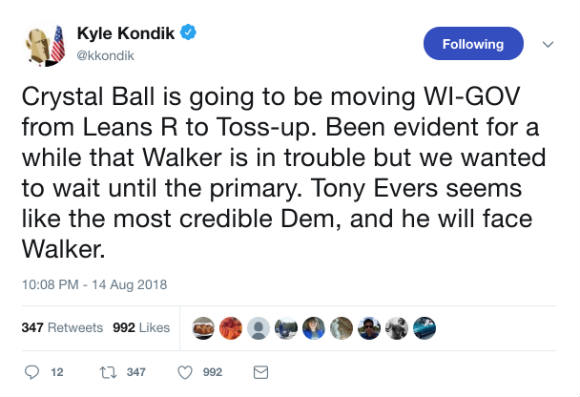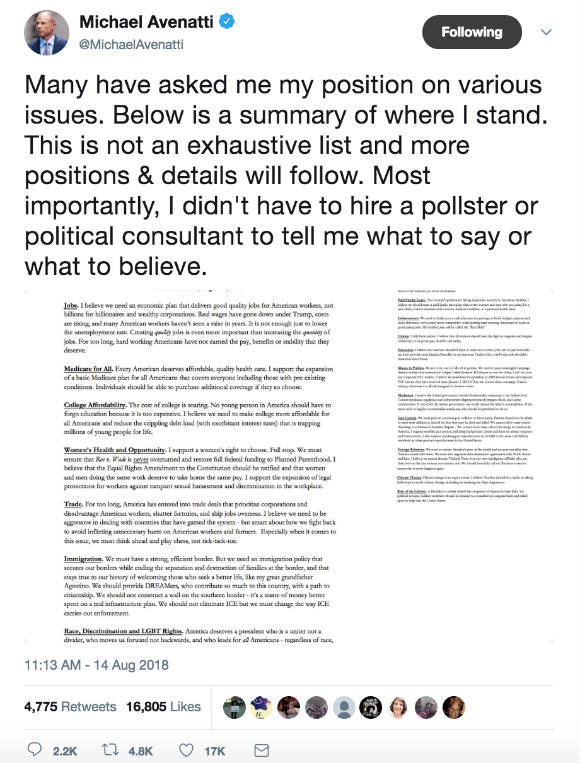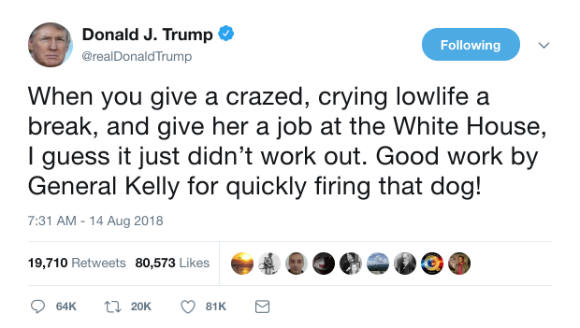The Hill’s Morning Report — GOP seeks to hold Trump’s gains in Midwest states


Welcome to The Hill’s Morning Report, and happy Wednesday! Our daily email gets you up to speed on the most important developments in politics and policy, plus trends to watch, co-created by Jonathan Easley and Alexis Simendinger. (CLICK HERE to subscribe!) On Twitter, find us at @joneasley and @asimendinger.
Hill.TV’s “Rising” program, starting at 8 a.m., features White House spokesman Hogan Gidley, plus Kyle Kondik, the managing editor for election-forecasting outlet Sabato’s Crystal Ball. http://digital-stage.thehill.com/hilltv
****
Tuesday night’s primaries will go a long way in determining whether Republicans are able to hold on to the gains they’ve made under President Trump in historically blue Midwestern states.
In Wisconsin, Republicans nominated state Sen. Leah Vukmir to take on Sen. Tammy Baldwin (D-Wis.), who is one of 10 Democrats up for reelection in states Trump carried in 2016. Vukmir has been critical of Trump in the past but triumphed in the GOP primary over Marine Corps veteran Kevin Nicholson by backing some of the president’s core policy positions, such as building a wall along the Southern border.
Trump was the first GOP presidential candidate to win Wisconsin in more than 30 years but he didn’t win it by much, edging out Democrat Hillary Clinton by less than 1 percentage point. Baldwin is the general election favorite, with the nonpartisan Cook Political Report rating the race as likely Democratic.
And Democrats last night nominated Wisconsin state Superintendent Tony Evers to challenge Gov. Scott Walker (R-Wis.), who is seeking a third term in office. Democrats have already reserved millions of dollars in airtime in an effort to finally take down Walker, who has survived two general elections and one recall election.

Of course, if Republicans want to have any chance at maintaining a majority in the House they must hold on to outgoing Speaker Paul Ryan’s (R-Wis.) seat. Republican Bryan Steil, a former Ryan aide who was endorsed by the Speaker, will square off against ironworker Randy Bryce (D), known as “Ironstache,” in a race that Republicans should win.
The landscape is a little different in Minnesota, which Clinton carried by less than 2 points in 2016. Trump and Vice President Pence have been campaigning in Minnesota, believing it represents another opportunity to flip a traditionally blue state in the Midwest.
Both Senate seats are up for grabs this year, although Democrats will be favored to hang on in each race.
Sen. Tina Smith (D-Minn.), who replaced former Sen. Al Franken (D-Minn.) after he resigned last year amid allegations he groped women, will face Republican state Sen. Karin Housley in the general election. Smith is the early favorite to serve out Franken’s final two years in Minnesota’s first-ever Senate matchup between two women.
And Sen. Amy Klobuchar (D-Minn.), who is enormously popular at home, will be heavily favored over Republican state Rep. Jim Newberger (R-Minn.).
Rather, Republicans will be eyeing two open seats in rural districts which might represent their best chance at turning blue seats red in the House this cycle.
Rep. Rick Nolan (D-Minn.) is not seeking reelection in the 8th Congressional District, which Trump carried by nearly 16 points in 2016. And Rep. Tim Walz (D-Minn.) is vacating a seat that the president carried by nearly 15 points to run for governor.
Walz will face Republican Jeff Johnson in another hotly contested governor’s race. Johnson shocked political watchers last night by winning the GOP primary against former Gov. Tim Pawlenty (R-Minn.), who left a lucrative Wall Street lobbying position to try and win his old job back.
The Hill: Democrats make history and other takeaways from Tuesday night’s primaries.
The New York Times: Groundbreaking night for women and diversity, while a Trump critic falls.
The Hill: The GOP’s midterm strategy takes shape.
LEADING THE DAY
***BREAKING LAST NIGHT*** Kansas Secretary of State Kris Kobach defeated Gov. Jeff Colyer in the GOP governor’s primary (The Hill) … The race had been too close to call for the past week as provisional ballots were tallied … Trump jumped into the race late, endorsing Kobach at the last minute despite warnings from Republican insiders that Colyer is the GOP’s best bet in the general election.
CAMPAIGNS & POLITICS: Democrats are threatening to take Republicans to court to keep Rep. Chris Collins (R-N.Y.) on the ballot this fall (The Hill).
Collins has been charged with insider trading and announced last week that he would not seek reelection. But New York’s strict ballot laws have made it difficult for Republicans to replace him.
Democrats are eager to tether Collins to the race, believing they have a shot at flipping the solidly Republican district if the GOP is unable to replace him on the ballot.
The legal battle that plays out here over the next few weeks could have enormous consequences for which party controls the House next year.
> Vermont Democrats nominated Christine Hallquist as their candidate for governor, making her the first transgender candidate to win a major party’s nomination for a state’s chief executive post (The Hill).
> Michael Avenatti, the attorney who became a cable news sensation for representing adult-film actress Stormy Daniels, is serious about running for president. Avenatti has received glowing early reviews from liberals in the first-in-the-nation caucus state of Iowa and on Tuesday released a 3-page paper outlining his policy positions.

> The Democratic National Committee (DNC) will have some controversy on its hands when it meets next Thursday in Chicago for its annual summer meeting.
Rep. Cedric Richmond (D-La.), the chairman of the Congressional Black Caucus, is furious over the DNC’s proposal to limit the influence of superdelegates in picking the next Democratic presidential nominee (The Hill).
And the DNC is reviewing domestic violence allegations against Deputy Chairman Keith Ellison (D-Minn.). Ellison denies the allegations. He won the Democratic primary to run for Minnesota attorney general on Tuesday night (The Hill).
> Politicians in Florida are scrambling to appeal to Puerto Ricans, who have become a massive voting bloc in the Sunshine State (The Hill). A new Democratic poll has Sen. Bill Nelson (D-Fla.) in a dead heat with Gov. Rick Scott (R-Fla.) in the Senate race there (Politico).
> Former Libertarian Party presidential candidate Gary Johnson is running for Senate in New Mexico, where he previously served two terms as a Republican governor (The Hill).
Johnson joins Republican Mark Rich in challenging Sen. Martin Heinrich (D-N.M.), who is seeking reelection to a second term. The nonpartisan Cook Political Report has the race rated as solidly Democratic.
More from the campaign trail … State legislatures poised to change as more women run for office (Reuters) … Democratic activist Tom Steyer will spend $10 million on a get-out-the-vote campaign ahead of the 2018 midterm elections (Politico) … Republicans become entangled by family feuds (The Hill) … Maryland Gov. Larry Hogan (R) has a solid lead over Democrat Ben Jealous in the state’s gubernatorial race according to a new independent poll (Maryland Matters).
INVESTIGATIONS: Attorneys representing one-time Trump campaign chairman Paul Manafort rested their case on Tuesday without calling any witnesses on his behalf. Manafort also declined to testify for himself (The Hill).
Attorneys from both sides will make closing arguments on Wednesday, which will be the 12th day of the trial. The case could be sent to the jury today.
Manafort’s attorneys are hoping that testimony from the prosecution’s key witness, Manafort’s longtime business partner Richard Gates, will leave the jury with reasonable doubt about Manafort’s guilt.
The defense cast Gates as a philanderer who embezzled hundreds of thousands of dollars from Manafort’s firm and lied to special counsel Robert Mueller’s team.
Still, most court watchers assess the case against Manafort as strong.
He is charged with 18 counts of tax and bank fraud stemming from allegations he hid millions of dollars from the government through foreign bank accounts and shell companies. The charges predate Manafort’s work for the campaign and are separate from the investigation into Russia’s election interference.
It is the first special counsel case to go to trial, and Mueller’s team wants to secure a conviction. But regardless of the outcome, Manafort’s legal problems will continue through the fall.
Manafort and his former business associate Konstantin Kilimnik will go on trial in Washington, D.C., in September on charges they illegally lobbied on behalf of Viktor Yanukovych, the former president of Ukraine and an ally of Russia.
IN FOCUS/SHARP TAKES
➔ CONGRESS: The Senate is back to work today after a short summer break, but don’t expect most members to sound thrilled about their return to Washington.
Democratic Sens. Joe Donnelly (Ind.) and Heidi Heitkamp (N.D.) will meet today with Brett Kavanaugh, the president’s nominee to the Supreme Court. Kavanaugh will testify during a Senate Judiciary Committee confirmation process during the first week of September. Donnelly and Heitkamp, both seeking reelection in states Trump won in 2016, join fellow Democrat Joe Manchin of West Virginia, who has already interviewed Kavanaugh once, in navigating challenging political crosswinds.
Progressive activists are increasingly critical of Senate Democrats for what they say is a failure to settle on a hard line against Kavanaugh, 53, that can unite the entire caucus to vote against his nomination (The Hill).
The Washington Post: Senate Republicans hope to confirm two more federal appeals court judges by the end of this week, adding to a record-breaking string of 24 appellate judges installed since Trump was sworn in.
Appropriations: The Senate is poised to dive into two large and complex appropriations bills: Defense and Labor, plus Health and Human Services and Education. The Labor bill will sorely test a bipartisan agreement among Senate leaders to keep the appropriations process free of controversial policy riders this year (The Hill). Lawmakers face a deadline of Sept. 30 to keep the government funded.
Russia sanctions: A bipartisan group of senators would like to harden economic pressure on Russia amid growing concerns about the Kremlin’s attempts to influence the midterm elections. But proposed new penalties on Russia’s energy and financial sectors could trigger a cascade of damaging economic and other effects through Europe and the United States, if Congress were to act and the president signed such a measure into law (The Hill).
➔ WHITE HOUSE & ADMINISTRATION: Whew! Mid-August is heating up in a lot of different ways …
Trump v. Amazon: The Hill’s Jordan Fabian reports that Trump on Friday received an as-yet-unseen government report recommending ways to overhaul the U.S. Postal Service and blot up some of its red ink. Stakeholders worry the report could revive Trump’s long-running feud with Amazon and its founder, Jeff Bezos, the owner of The Washington Post. The president asserts that pricing for package delivery accomplished by the Postal Service for Amazon is a costly deal for taxpayers. Numerous fact-checkers say Trump is wrong about that.
Trump v. Omarosa: In a jousting match between two media-savvy contenders, things got uglier on Tuesday as the president called former White House aide Omarosa Manigault Newman “a dog.” The Trump campaign is trying to enforce a confidentiality agreement from 2016 over what the president maintains are false assertions she made about him during interviews accompanying her new, tell-all West Wing memoir. Both seasoned combatants, once allies, are working overtime to shred each other’s credibility.

The Hill: Calling Manigault Newman, who is African-American, a “dog” rekindled accusations about the president’s willingness to traffic in racially loaded rhetoric. The former participant in “The Apprentice” claims to have secret recordings and has accused the president of being a racist, a liar, and cognitively and temperamentally “unfit.”
The Hill: Manigault Newman says Trump knew in advance about hacked emails stolen from the Democratic National Committee and from advisers to Hillary Clinton’s presidential campaign and released, allegedly by Russia, through WikiLeaks. Manigault Newman did not present evidence of this and suggested that she did not bring it up in a previous meeting she says she had with Mueller’s team. The president has denied it.
“I am going to expose the corruption that went on in the campaign and in the White House.” – Manigault Newman, interview on MSNBC
The Hill: Trump’s reelection campaign filed for arbitration against Manigault Newman over confidentiality. And the campaign hired attorney Charles Harder in the case (CNBC).
The Associated Press: In exchange for keeping confidences, discarded Trump staff members have received cushy compensation if they sign nondisclosure agreements, which are considered highly unusual in government and perhaps unenforceable.
Manigault Newman says she was offered $15,000 a month after she was fired, but declined the money. “Former staff members have found a wide range of rehabilitation within Trump’s orbit: his re-election campaign, the Republican National Committee, and outside groups that support both him and Vice President Mike Pence,” AP reports.
“She worked here for a year and didn’t have any of these things to say. In fact, everything she said was quite the opposite, and not just the year that she worked, but the time that she spent on the campaign trail. And I think it’s really sad what she’s doing at this point.” – Sarah Huckabee Sanders, White House press secretary
Trump v. Congress: The president told Congress he objects on legal and constitutional grounds to some provisions dealing with Russia in the defense policy bill he signed on Monday, suggesting he may not enforce them (USA Today).
Defense contracts – “Space Force”: While the Trump administration outlined a vision for a new Space Force, a legislative proposal would be required to fill in the details. Imagining a Pentagon spending spree to create a sixth branch of the military, defense contractors are enthused about assisting with those details (The Hill).
The Morning Report is created by journalists Jonathan Easley jeasley@digital-stage.thehill.com & Alexis Simendinger asimendinger@digital-stage.thehill.com. Suggestions? Tips? We want to hear from you! Share The Hill’s reporting and newsletters, and encourage others to SUBSCRIBE!
OPINION
What happened to the Tea Party? by Democratic strategist Brad Bannon, opinion contributor for The Hill. http://bit.ly/2vJDpyq
Puerto Rico has lost the power to self-govern, by Andres L. Cordova, opinion contributor for The Hill. http://bit.ly/2vMqUC6
WHERE AND WHEN
The House is out until after Labor Day.
The Senate returns today from its summer break and resumes consideration of the nomination of A. Marvin Quattlebaum Jr. to be a judge on the United States 4th Circuit Court of Appeals. A vote is scheduled at 5:30 p.m. Here’s the Senate lay of the land for August, as summarized by Roll Call.
The president has no public schedule.
The vice president will be in Des Moines, Iowa, to stump for Rep. David Young (R) and the Republican Party of Iowa. Later, Pence delivers a speech about taxes at the convention center in Des Moines in the afternoon, and then returns to Washington.
The U.S. Census Bureau reports advance monthly sales for retail and food services, as well as its advance monthly assessment of inventories and sales in manufacturing and trade. Analysts are watching the data to gauge consumer sentiment amid rising summer gas prices as well as escalating trade tensions.
Former Trump campaign manager Corey Lewandowski, a senior strategist with Pence’s Great America PAC, is the featured newsmaker during a roundtable at 9 a.m. covered by Washington reporters, organized by The Christian Science Monitor.
The United States Capitol Historical Society hosts a talk today in Washington by Seth Masket, director of the Center on American Politics at the University of Denver and Kluge chair of American law and governance at the Library of Congress, about how and what political parties learn from election losses, with a close look at the Democratic Party in the wake of the 2016 presidential election. The event from noon to 1 p.m. is open to the public with pre-registration.
ELSEWHERE
> Sexual assault: In Pennsylvania, more than 300 “predator priests” in six Roman Catholic dioceses victimized at least 1,000 children and were protected by church leaders, according to a grand jury report released Tuesday. “The main thing was not to help children, but to avoid scandal,” the report says. “Priests were raping little boys and girls and the men of God who were responsible for them not only did nothing: They hid it all” (USA Today).
> Disaster: In Genoa, Italy, on Tuesday, a massive section of a bridge collapsed during a storm, crushing vehicles and buildings, and killing at least 37 people, according to officials (The New York Times). World leaders issued statements of support for the Italian people.


> Terror: A young, male driver was arrested in London on Tuesday after ramming pedestrians and bicyclists with a car near parliament. No one was killed in the attack, which is being investigated as terrorism (Telegraph). A source identified the suspect as Salih Khater, a British citizen of Sudanese origin, Reuters reports today.
> Demonstrators: Native American youth activists run hundreds of miles to honor — and take back — the land that is sacred to them (Outside)
> U.S. border: Tourist visitor or “intending immigrant”? A Mexican businesswoman who was accustomed to making frequent visits to her aging parents in Maryland using a tourist visa has been barred from entering the United States for five years. In a case study of Trump administration enforcement, the Washington Post examines the justifications used by U.S. Customs and Border Protection to revoke an entry visa, including the woman’s use in 2016 of health care in Maryland when she was pregnant.
THE CLOSER
And finally … Television news history. On Aug. 15, 1948, CBS inaugurated the first nightly news broadcast. Anchorman Douglas Edwards, a pioneer in national television news, anchored the influential evening broadcast and kept at it for 14 years. Early in 1948, President Harry Truman used live television for the first time at the White House to address the American people about the State of the Union and about governance.
Television influenced the presidential election of 1948, but the medium’s nationwide impact was limited because only 35,000 TV sets were in use and only 37 stations were on the air, according to historians. But just two years later, about 6 million TV sets found their way into living rooms, and the prevalence of television news and entertainment in American life exploded from there.
Competing technologies eroded the size of audiences for network evening news over the years, but the influence of television in politics remains front and center.

Copyright 2023 Nexstar Media Inc. All rights reserved. This material may not be published, broadcast, rewritten, or redistributed. Regular the hill posts







